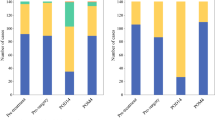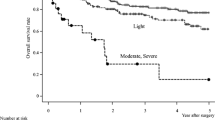Abstract
Background
The Charlson Comorbidity Index (CCI), an indicator that objectively quantifies comorbidities, reduces nutritional status; however, the impact of the CCI on the postoperative nutrition indexes of patients with esophageal cancer remains unclear.
Methods
In total, 336 patients with esophageal cancer who underwent surgery between January 2011 and April 2017 were included in this study. We investigated the relationship between the CCI and postoperative nutrition indexes.
Results
Patients were divided into two groups: CCI ≤1 (low CCI group) and CCI ≥2 (high CCI group). A high CCI was significantly associated with shortened overall survival (OS; 3-year OS rate of 77.9% in the low CCI group versus 59.7% in the high CCI group; p = 0.008). Nutritional indexes, such as the Prognostic Nutritional Index (PNI), at 1 month after esophagectomy were significantly lower in the high CCI group than in the low CCI group (p = 0.031); however, the PNI at 6 months after surgery was similar between the high and low CCI groups. Multivariate analysis identified high CCI as an independent risk factor associated with PNI <45 in esophageal cancer patients at 1 month after esophagectomy (p = 0.047).
Conclusion
This study showed that CCI ≥2 was significantly associated with poor PNI at 1 month after surgery for esophageal cancer, indicating that it is necessary to administer effective nutritional interventions for patients with postoperative malnutrition, especially those with multiple comorbidities.

Similar content being viewed by others
References
Bollschweiler E, Plum P, Mönig SP, et al. Current and future treatment options for esophageal cancer in the elderly. Expert Opin Pharmacother. 2017;18:1001–10.
Kubo Y, Miyata H, Sugimura K, et al. Prognostic Implication of Postoperative Weight Loss After Esophagectomy for Esophageal Squamous Cell Cancer. Ann Surg Oncol. 2020;28:184–93.
Faiz Z, Van Putten M, Verhoeven RHA, et al. Impact of Age and Comorbidity on Choice and Outcome of Two Different Treatment Options for Patients with Potentially Curable Esophageal Cancer. Ann Surg Oncol. 2019;26:986–95.
Pultrum B, Bosch DJ, Nijsten MW, et al. Extended esophagectomy in elderly patients with esophageal cancer: minor effect of age alone in determining the postoperative course and survival. Ann Surg Oncol. 2010;17:1572–80.
Miyata H, Yamasaki M, Makino T, et al. Clinical Outcome of Esophagectomy in Elderly Patients with and Without Neoadjuvant Therapy for Thoracic Esophageal Cancer. Ann Surg Oncol. 2015;22:794–801.
Gockel I, Niebisch S, Ahlbrand CJ, et al. Risk and Complication Management in Esophageal Cancer Surgery: A Review of the Literature. Thorac Cardiovasc Surg. 2016;64:596–605.
Riccardi D, Allen K. Nutritional management of patients with esophageal and esophagogastric junction cancer. Cancer Control. 1999;6:64–72.
Anandavadivelan P, Wikman A, Johar A, Lagergren P. Impact of weight loss and eating difficulties on health-related quality of life up to 10 years after esophagectomy for cancer. Br J Surg. 2018;105:410–8.
Okuno T, Wakabayashi M, Kato K, et al. Esophageal stenosis and the Glasgow Prognostic Score as independent factors of poor prognosis for patients with locally advanced unresectable esophageal cancer treated with chemoradiotherapy (exploratory analysis of JCOG0303). Int J Clin Oncol. 2017;22:1042–9.
Matsumoto Y, Zhou Q, Kamimura K, et al. The Prognostic Nutrition Index Predicts the Development of Hematological Toxicities in and the Prognosis of Esophageal Cancer Patients Treated with Cisplatin Plus 5-Fluorouracil Chemotherapy. Nutr Cancer. 2018;70:447–52.
Li P, Wang X, Lai Y, et al. The prognostic value of pretreatment prognostic nutritional index in esophageal squamous cell carcinoma: a meta-analysis. Medicine (Baltimore). 2019;98:e15280.
Martin L, Lagergren P. Risk factors for weight loss among patients surviving 5 years after esophageal cancer surgery. Ann Surg Oncol. 2015;22:610–6.
Charlson ME, Pompei P, Ales KL, et al. A new method of classifying prognostic comorbidity in longitudinal studies: development and validation. J Chronic Dis. 1987;40:373–83.
Ding D, Feng Y, Song B, et al. Effects of preoperative and postoperative enteral nutrition on postoperative nutritional status and immune function of gastric cancer patients. Turk J Gastroenterol. 2015;26:181–5.
Okada G, Momoki C, Habu D, et al. Effect of Postoperative Oral Intake on Prognosis for Esophageal Cancer. Nutrients. 2019;11:1338.
Spatola L, Finazzi S, Calvetta A, et al. Subjective Global Assessment-Dialysis Malnutrition Score and arteriovenous fistula outcome: a comparison with Charlson Comorbidity Index. J Vasc Access. 2019;20:70–8.
Gong G, Wan W, Zhang X, et al. Correlation between the Charlson comorbidity index and skeletal muscle mass/physical performance in hospitalized older people potentially suffering from sarcopenia. BMC Geriatr. 2019;19:367.
Brierley JD, Gospodarowicz MK, Wittekind C. TNM Classification of Malignant Tumors. 8th edn. New York: Wiley; 2017.
Ollivier L, Padhani R, Leclere J. International criteria for measurement of tumour response. Cancer Imaging. 2001;2:31–2.
Japanese Esophageal Society. Japanese Classification of Esophageal Cancer. 11th edn. Tokyo: Kanehara Syuppan; 2015.
Sugimura K, Miyata H, Shinno N, et al. Prognostic Factors for Esophageal Squamous Cell Carcinoma Treated with Neoadjuvant Docetaxel/Cisplatin/5-Fluorouracil Followed by Surgery. Oncology. 2019;97:348–55.
Kubo Y, Miyata H, Sugimura K, et al. Prophylactic Effect of Premedication with Intravenous Magnesium on Renal Dysfunction in Preoperative Cisplatin-Based Chemotherapy for Esophageal Cancer. Oncology. 2019;97:319–26.
Miyata H, Sugimura K, Yamasaki M, et al. Clinical Impact of the Location of Lymph Node Metastases After Neoadjuvant Chemotherapy for Middle and Lower Thoracic Esophageal Cancer. Ann Surg Oncol. 2019;26:200–8.
Miyata H, Sugimura K, Motoori M, et al. Clinical Implications of Conversion Surgery After Induction Therapy for T4b Thoracic Esophageal Squamous Cell Carcinoma. Ann Surg Oncol. 2019;26:4737–43.
Tanaka K, Makino T, Yamasaki M, et al. An analysis of the risk factors for anastomotic stricture after esophagectomy. Surg Today. 2018;48:449–54.
Dindo D, Demartines N, Clavien PA. Classification of surgical complications: a new proposal with evaluation in a cohort of 6336 patients and results of a survey. Ann Surg. 2004;240:205–13.
Toiyama Y, Miki C, Inoue Y, et al. Evaluation of an inflammation-based prognostic score for the identification of patients requiring postoperative adjuvant chemotherapy for stage II colorectal cancer. Exp Ther Med. 2011;2:95–101.
Onodera T, Goseki N, Kosaki G. Prognostic nutritional index in gastrointestinal surgery of malnourished cancer patients. Nihon Geka Gakkai Zasshi. 1984;85:1001–5.
Backemar L, Lagergren P, Johar A, et al. Impact of comorbidity on mortality after esophageal cancer surgery. Br J Surg. 2015;102:1097–105.
Yamashita K, Watanabe M, Mine S, et al. The impact of the Charlson comorbidity index on the prognosis of esophageal cancer patients who underwent esophagectomy with curative intent. Surg Today. 2018;48:632–9.
Pinato DJ, North BV, Sharma R. A novel, externally validated inflammation-based prognostic algorithm in hepatocellular carcinoma: the prognostic nutritional index (PNI). Br J Cancer. 2012;106:1439–45.
Chan AW, Chan SL, Wong GL, et al. Prognostic Nutritional Index (PNI) Predicts Tumor Recurrence of Very Early/Early Stage Hepatocellular Carcinoma After Surgical Resection. Ann Surg Oncol. 2015;22:4138–48.
Xue Y, Zhou X, Xue L, et al. The role of pretreatment prognostic nutritional index in esophageal cancer: a meta-analysis. J Cell Physiol. 2019;234:19655–62.
Tamagawa A, Aoyama T, Tamagawa H, et al. Influence of Postoperative Pneumonia on Esophageal Cancer Survival and Recurrence. Anticancer Res. 2019;39:2671–8.
Mantovani A, Allavena P, Sica A, et al. Cancer-related inflammation. Nature. 2008;454:436–44.
Sakai M, Sohda M, Miyazaki T, et al. Association of Preoperative Nutritional Status with Prognosis in Patients with Esophageal Cancer Undergoing Salvage Esophagectomy. Anticancer Res. 2018;38:933–8.
Hikage M, Taniyama Y, Sakurai T, et al. The Influence of the Perioperative Nutritional Status on the Survival Outcomes for Esophageal Cancer Patients with Neoadjuvant Chemotherapy. Ann Surg Oncol. 2019;26:4744–53.
Author information
Authors and Affiliations
Corresponding author
Ethics declarations
Disclosure
Yuto Kubo, Koji Tanaka, Makoto Yamasaki, Kotaro Yamashita, Tomoki Makino, Takuro Saito, Kazuyoshi Yamamoto, Tsuyoshi Takahashi, Yukinori Kurokawa, Masaaki Motoori, Yutaka Kimura, Kiyokazu Nakajima, Hidetoshi Eguchi, and Yuichiro Doki have no conflicts of interest to declare.
Additional information
Publisher's Note
Springer Nature remains neutral with regard to jurisdictional claims in published maps and institutional affiliations.
Supplementary Information
Below is the link to the electronic supplementary material.
Rights and permissions
About this article
Cite this article
Kubo, Y., Tanaka, K., Yamasaki, M. et al. Influences of the Charlson Comorbidity Index and Nutrition Status on Prognosis After Esophageal Cancer Surgery. Ann Surg Oncol 28, 7173–7182 (2021). https://doi.org/10.1245/s10434-021-09779-1
Received:
Accepted:
Published:
Issue Date:
DOI: https://doi.org/10.1245/s10434-021-09779-1




